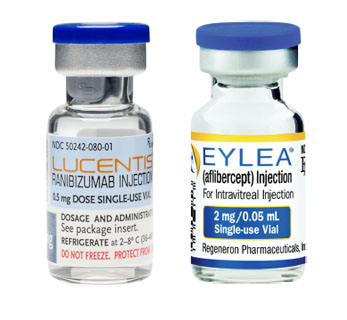Source: Thailand Medical News Sep 22, 2019 6 years, 5 months, 1 week, 3 days, 49 minutes ago
Researchers from St. Michael's Hospital in Toronto have discovered that certain drugs used to treat retinal eye diseases are excreted into breast milk, raising possible safety concerns for developing infants. The medications in the spotlight was ranibizumab (trade name Lucentis) and aflibercept (trade name Eylea.)
Medications Containing Anti-VEGFs Can Affect An Infant’s Development.
Eye medications like ranibizumab and aflibercept used to treat several retinal diseases, contain an agent called anti-vascular endothelial growth factor (anti-VEGF), which blocks the eye's production of vascular endothelial growth factor (VEGF). VEGF is a protein that stimulates the development of blood vessels but is associated with retinal diseases in high quantities. VEGF is present in breast milk and plays an important role in the development of an infant's digestive system.
As a result, anti-VEGF drugs in a nursing mother raise alarms about possible adverse events in a developing infant if the drugs were to pass into breast milk and suppress VEGF.
Co-lead author of the study, Dr. Rajeev Muni, a vitreoretinal surgeon commented in an interview
with Thailand Medical News "As retina specialists, we often tell our pregnant or nursing patients that there's a risk of a small amount of these drugs making its way into the breast milk, but we were not sure until this study. We do not want these patients to lose their vision so we make a decision, despite limited information."
Dr. Muni and Dr. Verena Juncal, co-lead author and a retinal fellow at St. Michael's, measured the concentrations of retinal medications in the breast milk of three lactating mothers following injection of anti-VEGF therapy. Each patient represented a different scenario, one continued to breastfeed while receiving therapy, one discontinued breastfeeding, and one never started.
Study Confirmed Drugs Entered Into Breast Milk
The team found that the drugs were secreted into the breast milk within the first couple days following injection, with a corresponding reduction in VEGF levels. They also found that the amount of medication detected in the patient who continued to breastfeed was significantly lower than the other two patients, suggesting that the medication was constantly excreted and ingested by the infant, which was really worrying.
These results indicated without doubt that the drug reaches the breast milk. Though some readers may question the small sample size,if the drug reaches the breast milk in three patients, it'll reach in 30 patients or more because it's the same biological process.
As the first study to evaluate the presence of Health Canada approved anti-VEGF therapy in human breast milk,these results provide a resource for ophthalmologists and retina specialists counselling pregnant and nursing patients.
Next, the researchers hope to collaborate with a team of pediatricians to find out whether the drug passes from the breast milk through the infant's digestive system and into the blood stream. If measurements can be made of the levels of these drugs in the infant's blood, the researchers can figure o
ut the exposure over a long period of time as it can determine the possible effect of these drugs on the infant over a long period of time.
Breastfeeding Mothers Warned To Take Precautions
All new mothers who are breastfeeding their infants are advised to consult their doctors immediately if they are on any such eye medications. Also if they are on any other topical or oral medications while they are also breastfeeding, they should consult their doctors to see if those medications as well can have any way of getting into the breastmilk and affecting the infants.
Reference:
Verena R. Juncal et al, Ranibizumab and Aflibercept Levels in Breast Milk after Intravitreal Injection, Ophthalmology (2019). DOI: 10.1016/j.ophtha.2019.08.022 